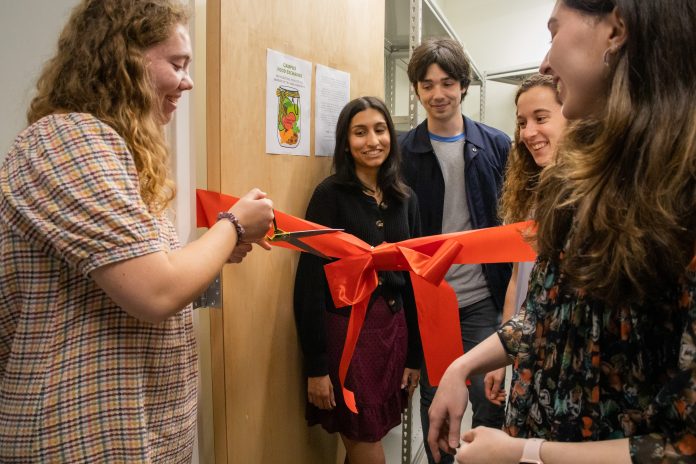Friday, April 14, the College of William and Mary’s Food for All student organization held the grand opening of its second food exchange in Sadler Room 157. Food for All hopes to combat food insecurity for College students, faculty and staff.
“Food for All was established in 2022, incorporating various pre-existing resources on campus, including the Campus Food Exchange (formerly the Campus Food Pantry), swipe drives and COVID-19 quarantine food deliveries. It continues and expands these resources to serve students, faculty and staff who may face issues of food access,” says the Food for All website.
Students founded the first Campus Food Exchange at the College in the lower level of the Wesley Foundation in 2019, acting as a confidential resource for members of the College community. After Food for All’s official founding, the organization now manages both food exchange locations as the only food-based organization on campus.
President of Food for All Allisyn Lam ’25 introduced the opening of Sadler’s satellite location.
“We’re going to be open any time that the Sadler building is open,” Lam said. “The background is that we are on a trial period right now with Sadler to prove that this is a necessity on campus. Basically, the campus has not run any official surveys for, I think, a few years prior to COVID and obviously with inflation and food prices going up, our services have become a lot more essential on campus. So now Sadler is asking for that data, but the only way we get data is if students fill out the QR code on the back of the door.”
Lam and Food Rescue and Outreach Chair Bridget O’Keefe ’24 collectively cut the ribbon to the food exchange and made final comments before inviting attendees inside.
“We’re fighting the stigma that surrounds this type of work because food access is very different on college campuses than it is anywhere else,” Lam said. “The students who are relying on this service truly rely on it, so that’s why this is super important that we were able to get this space to keep working on making this a little bit more accessible for everybody on campus.”
Food for All is currently working with Sodexo, Campus Catering and various community partners to help reduce food waste on campus and share excess food with the broader Williamsburg community. Food for All does not receive any funding from the College, and instead relies on grants, donations and profit shares with aid from the Wesley Foundation in order to maintain its operations. O’Keefe mentioned that it has been a long process to fund and get approval for the Sadler location.
“We knew we wanted an on-campus location, and we also knew, just working with Max [Blalock] from Wesley that that was going to be a really big roadblock for us, because in the past we haven’t had that support,” O’Keefe said. “One of our main contacts was [Associate Vice President for Student Engagement and Leadership] Drew Stelljes, and he got us in contact with a lot of the Sadler building staff.”
The organization’s Student Assembly Liaison Jack Howell ’24 discussed the importance of a more holistic approach to combating food insecurity among College students and urged future students to fill similar roles to battle this issue long-term.
“If we graduate, no one’s going to be filling this gap,” Howell said. “We’re really advocating for the university to take a more aggressive response to making sure this need is met.”
Howell, Lam and O’Keefe all emphasize the importance of their partnerships within the campus community, including Rev. Max Blalock, a minister for Wesley Campus Ministries, Drew Stelljes and Director of Student Unions and Engagement Eric Margiotta. Lam discussed her role on the executive board and how she became involved with Food for All.
“I kind of wanted to work on something that would last even after I graduated,” Lam said. “This is something I want to see grow and expand and a collective dream for us as a group is that in 15, 20 years we come back and Food for All has not only led to systemic changes on campus in the way that things are run, but that this isn’t an issue as much anymore.”
Member of Food for All Rowan Carpenter ’26 was excited to work with Food for All after working with food-based organizations throughout high school.
“My parents got me started volunteering, making lunches for the homeless,” Carpenter said. “In high school, I started my own project, which collected food for senior citizens for Meals on Wheels and other stuff for them. So I was looking for volunteer opportunities and I saw this fits in with what I’ve done over time, so I decided to continue it.”
Lam, O’Keefe and other executive board members hope that Food for All can increase their reach on campus, and that more people acknowledge the realities of food insecurity on campuses and beyond.
“My big takeaway is that food insecurity does exist on this campus, and that’s a storyline that often gets written out,” Lam said. “It’s not something that we acknowledge, but it’s here and we know it’s here because our resources are being used, and with inflation and food costs rising, as I also mentioned, it’s become an even bigger problem. Food insecurity exists here and we’re trying to do something about it. This is a resource that’s increasing awareness and our accessibility.”

